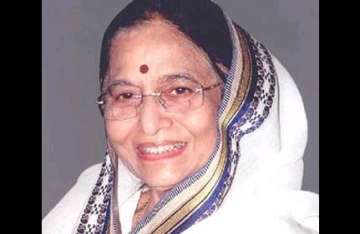President Calls For High Vigil Against Terror
President Pratibha Patil on Monday said the government would provide high vigil and take necessary action to address issues related to internal security. "Government is committed to maintaining high vigil and take appropriate measures to
President Pratibha Patil on Monday said the government would provide high vigil and take necessary action to address issues related to internal security.
"Government is committed to maintaining high vigil and take appropriate measures to address internal security challenges," she said in her address to the nation on the eve of 60th Republic Day.
The President said the country has been a target of terrorism for more than two decades and the government has taken and will continue to take necessary steps to tackle threats emanating from terrorism. "It will continue to work with the international community to combat this menace," she said.
Her remarks assume significance in the context of Home Minister P Chidambaram recently unveiling braoadlines of a new security architecture he would like to be in place to tackle terrorism.
Referring to the significant strides made by India and it becoming fourth largest economy of the world in terms of purchasing power parity, Patil said the country's target of achieving a double digit growth rate is plausible and realistic, given its impressive performance during the last decade and its resilience during the global economic downturn.
Patil said "We should continue with policies that promote growth, and also take growth patterns to the bottom of the pyramid and, to those currently outside its purview," she said.
She said empowering the poor and the disadvantaged, enabling them to move up the economic ladder, to join the ranks of the prosperous, is a task that must be accomplished by everyone.
"Women need to be made full and equal partners. The inclusive growth strategy, which we have chosen, can make our growth process equitable and sustainable," she said.
The President said India's secularism is a constitutionally chosen path that entails respect for all religions and its place in the national life is unalterable.
"India is a land where followers of different religions have lived together for centuries. We must maintain social cohesion. Our tradition of living in accord with each other must continue to form an integral part of the rhythm of life of our future generations," she said.
Patil said in the first decade of the 21st century, India witnessed transformational changes and it also emerged as a force driving change in the world.
"Our achievements and experiences have, indeed, brought the nation to a definitional stage, where the promise of a bright future as a developed and progressive nation is for us to claim, as we all work together with conviction and commitment."
Patil said "However, as we overcome deficiencies and convert our strengths into an energetic force, we must remain deeply conscious of what we must preserve and what we must change."
Observing that India ably demonstrated that it is a functioning democracy, by time and again, choosing its governments through the ballot and by taking democracy to the grassroots, she said the country must continue with its democratic principles and way of life.
"Also, as we are aware, democracy is very much more demanding. It is the rule of law. It is the rule of reason. And, as India has shown to the world, it is the rule of non-violence," she said.
Patil said as in the past, in the future also, the voice of India in the world would be a voice for peace, a voice for development, and a voice of hope and in the global arena, India will seek a change in the structure of multilateral institutions, so that they reflect contemporary realities.
"We will continue to cooperate with the international community to deal with global issues. We will seek to build friendly relations with countries in our region and those across the world," she said.
The President said the country should follow a positive agenda for the empowerment of women and a change in our mindsets will be important to remove prejudices and create equal opportunities for all citizens.
"This is essential for our inclusive growth agenda and for tapping the full potential of our population," she said. PTI
